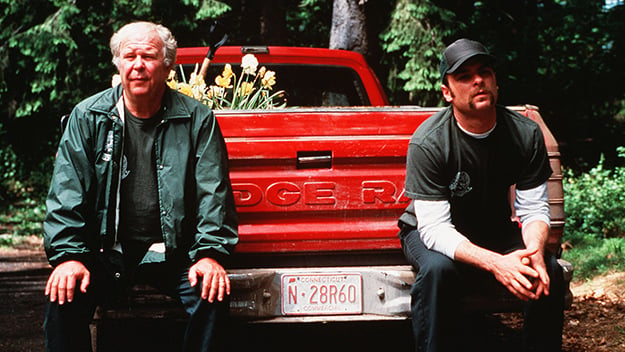Film Comment Recommends: Spring Forward
This article appeared in the August 26 edition of The Film Comment Letter, our free weekly newsletter featuring original film criticism and writing. Sign up for the Letter here.

Spring Forward (Tom Gilroy, 2021)
Much of the coverage of Ned Beatty’s death in June demonstrated, distressingly, that typecasting reaches beyond the grave. Judging by lede paragraphs, Beatty’s career consisted of 1) Deliverance and 2) Superman—with few noting that those two performances, while hardly delimiting the range of his talents, offer indelible takes on emasculation in wildly different tonal registers. Across 165 credits spanning everything from Southern Gothic to Pixar—and a single scene as a boardroom evangelist in Network that bagged him an Oscar nod—Beatty personified the hardworking, perennially undervalued character actor. Indeed, not one obit I read mentioned what I consider his greatest role: Murph, the elder of two Connecticut park-maintenance men (with Liev Schreiber’s rootless ex-con, Paul), whose friendship evolves over a year of plein-air labor in Tom Gilroy’s debut feature, Spring Forward.
As played by Beatty without a whiff of ham or a trace of condescension, Murph lives according to basic principles but is far from a simple man. He’s a quick study—less book-smart than the self-improvement-hyping Paul, but able to slyly distill the essence of his workmate’s mystic ramblings. (To Paul’s pontification on karma: “So, what goes around comes around.”) Even-tempered where Paul is volatile, Murph proves an ideal mentor for a young man who’s evidently never had one, but as the year progresses (with breathtaking New England scenery compensating for the shopworn seasonal motif), his fear of age’s toll on his faculties and his shame over parental failings come to the fore, with insight and solace arising from the unlikeliest source: Paul.
Passively skeptical at the outset, Beatty galvanizes in the film’s second half with a pair of heart-wrenching monologues in which Murph recounts a friend’s betrayal and later one of his own. Seldom has a figure on screen confronted the blind spots of human decency with a greater sense of unresolved disappointment. Gilroy’s words are true to the ages and backgrounds of his characters and the region they inhabit, and we learn as much about them from casual remarks and spontaneous outbursts as from long exchanges and monologues. A work that feints at predictability, Spring Forward sneaks up on you like an unexpected friendship. And Beatty—pigeonhole him at your peril—gives a tour de force of soul-stirring restraint.
Steven Mears is the copy editor for Field Notes and for Film Comment magazine, as well as a frequent contributor to FilmComment’s print and web editions, Metrograph’s Journal, and other publications.







